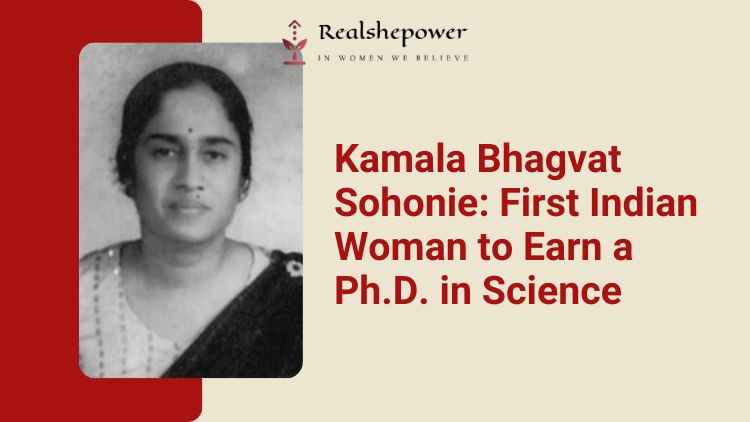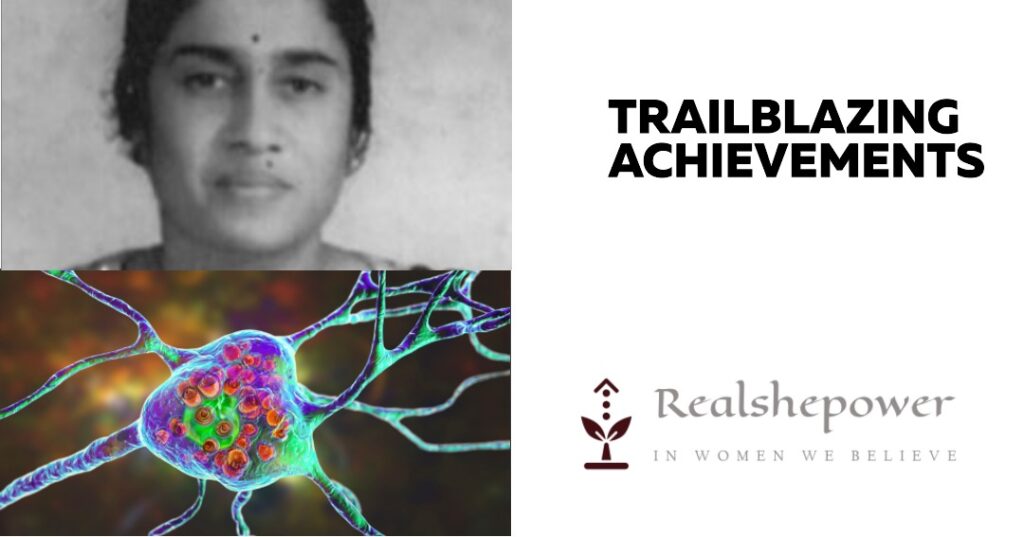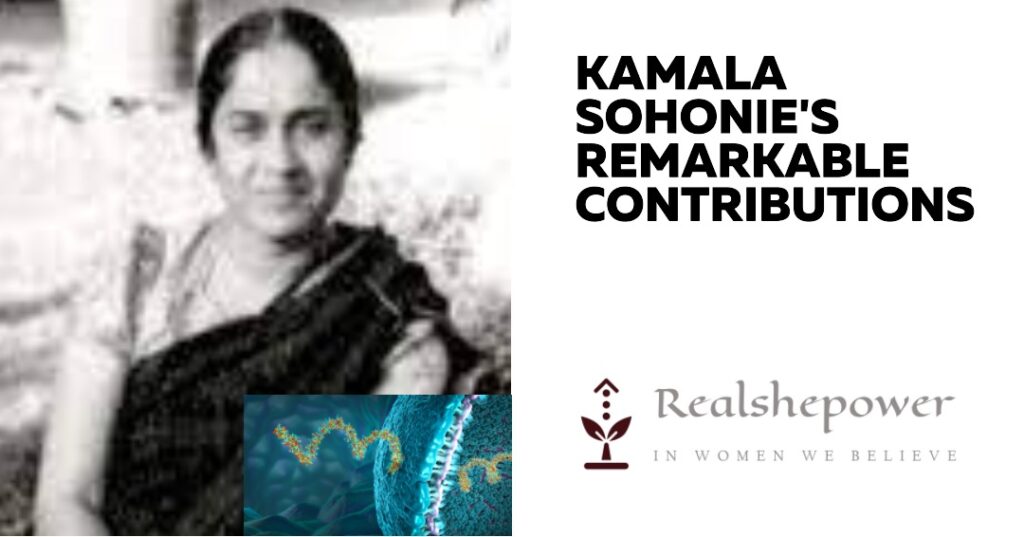Kamala Sohonie: Shattering Barriers and Forging a Scientific Legacy


In a world where women were often confined to traditional gender roles, Kamala Bhagvat Sohonie commonly known as Kamala Sohonie fearlessly pursued her passion for science, leaving an indelible mark on the scientific community. Born in 1912 in Bombay, India, she defied societal expectations and became a trailblazer in the field of biochemistry. This article delves into the extraordinary life of Kamala Sohonie, highlighting her remarkable achievements, pioneering research, and the lasting impact she had on women in science.
Table of Contents
Early Life and Educational Journey of Kamala Sohonie: Nurturing Curiosity and Academic Excellence

Intellectual Upbringing
Kamala Sohonie’s family played a significant role in shaping her life and supporting her scientific pursuits. Let’s take a closer look at her family background and the influence they had on her remarkable journey.
Kamala Sohonie was born on March 14, 1912, in Bombay, India. Her father, Bhagvat Narayan Sohonie, was a lawyer by profession, while her mother, Saraswati Sohonie, was a teacher. Kamala Sohonie grew up in a progressive and intellectually stimulating environment, surrounded by the values of education and intellectual curiosity.
Her parents recognized her exceptional intellect and nurtured her academic interests from a young age. They encouraged her to pursue her education and provided her with the necessary support and resources to excel in her studies. Their unwavering belief in Kamala Sohonie’s abilities laid the foundation for her success and instilled in her the confidence to pursue her passion for science.
Kamala Sohonie’s family also played a pivotal role in challenging societal norms and expectations. In a time when women were often confined to traditional roles, her parents encouraged her to break free from those limitations and pursue her dreams. Their progressive mindset and unwavering support allowed Kamala Sohonie to defy societal expectations and follow her true calling in the field of science.
Throughout her life, Kamala Sohonie maintained a close relationship with her family. Their support and encouragement continued to bolster her throughout her academic and professional journey. They celebrated her accomplishments and stood by her side during the challenges she faced as a woman in a male-dominated field.
Kamala Sohonie’s family also served as a source of inspiration for her. Her mother, Saraswati Sohonie, was a dedicated teacher who instilled in her a love for learning and a passion for knowledge. This influence shaped Kamala Sohonie’s dedication to education and her desire to contribute to the scientific community through her research and teaching.
While Kamala Sohonie’s family background may not be as widely discussed as her scientific achievements, their support, belief, and progressive mindset were instrumental in shaping her journey. Their unwavering encouragement and the nurturing environment they provided played a crucial role in Kamala Sohonie’s pursuit of a scientific career and her lasting impact on the field of biochemistry.
Academic Excellence
After completing her early education in Bombay (now Mumbai), Kamala Sohonie displayed exceptional academic aptitude, particularly in the field of chemistry. Her passion for the sciences led her to enroll at the Wilson College in Bombay, where she pursued a Bachelor of Science degree.
Following her undergraduate studies, Kamala Sohonie’s thirst for knowledge propelled her to further her education. She obtained a scholarship to pursue a Master’s degree in Biochemistry at the prestigious Indian Institute of Science (IISc) in Bangalore. During her time at IISc, she demonstrated remarkable talent and dedication, distinguishing herself as a top student in her program.
Driven by an insatiable desire to deepen her understanding of biochemistry, Kamala Sohonie set her sights on pursuing a Ph.D. Despite the limited opportunities available for women in academia at the time, she remained undeterred in her pursuit of higher education.
In 1939, Kamala Sohonie’s perseverance paid off as she became the first Indian woman to earn a Ph.D. in Science. Her doctoral research focused on the isolation and characterization of rennin, an enzyme involved in the digestion of milk. Her groundbreaking work in enzyme research laid the foundation for future advancements in the field of biochemistry.
But Kamala Sohonie’s thirst for knowledge did not end there. Her passion for learning and expanding her scientific horizons led her to secure a prestigious fellowship to study at the University of Cambridge in the United Kingdom. This opportunity allowed her to collaborate with eminent scientists and broaden her scientific expertise on the global stage.
Kamala Sohonie’s educational journey showcases her remarkable intellect, resilience, and determination to defy societal norms and pursue her passion for scientific inquiry. Her educational accomplishments not only broke barriers for women in science but also paved the way for future generations of female scientists to follow in her footsteps.
Trailblazing Achievements

Let’s delve deeper into her remarkable achievements:
1. First Indian Woman to Earn a Ph.D. in Science
In 1939, Kamala Sohonie achieved a significant milestone by becoming the first Indian woman to earn a Ph.D. in Science. Her groundbreaking research focused on the study of enzymes, specifically the isolation and characterization of rennin, an enzyme involved in the digestion of milk. This accomplishment shattered gender stereotypes and paved the way for future generations of women scientists in India and beyond.
2. Pioneering Research on Enzymes
Kamala Sohonie’s research on enzymes played a pivotal role in advancing our understanding of biochemical processes. Her meticulous studies contributed to the characterization of various enzymes, shedding light on their structure, function, and importance in biological systems. Her work formed a solid foundation for future advancements in the field of biochemistry.
3. International Recognition and Collaborations
Kamala Sohonie’s brilliance transcended borders, leading her to collaborate with renowned scientists on a global scale. She was awarded a prestigious fellowship to work at the University of Cambridge, where she collaborated with distinguished researchers in the field. This international exposure not only expanded her research horizons but also cemented her position as a respected scientist in the global scientific community.
4. Practical Applications of Research
Kamala Sohonie’s research on enzymes had practical implications in various fields. Her findings provided valuable insights into the physiological processes of digestion, metabolism, and protein synthesis. This knowledge had direct applications in medicine, as it enhanced our understanding of enzyme-related disorders and facilitated the development of diagnostic and therapeutic approaches. Additionally, her work had implications for the agricultural sector, aiding in the development of techniques to enhance crop yield and optimize food production.
Pioneering Research: Kamala Sohonie’s Remarkable Contributions

Kamala Sohonie’s pioneering research in the field of biochemistry revolutionized our understanding of enzymes, protein metabolism, and their implications in various areas of science and medicine. Her groundbreaking work not only advanced scientific knowledge but also had practical applications. Let’s explore in detail some of Kamala Sohonie’s notable contributions:
1. Enzyme Characterization and Rennin Study
One of Kamala Sohonie’s significant research endeavors focused on the isolation and characterization of rennin, an enzyme involved in the digestion of milk. Her doctoral research at the University of Bombay, where she became the first Indian woman to earn a Ph.D. in Science, centered around the study of enzymes and their properties.
Through meticulous experimentation and analysis, Kamala Sohonie succeeded in isolating rennin and elucidating its structural and functional properties. Her work shed light on the enzyme’s role in milk digestion and paved the way for a deeper understanding of enzymatic reactions.
2. Protein Metabolism and Nutritional Science
Kamala Sohonie’s research extended beyond enzyme characterization to the study of protein metabolism. Her groundbreaking investigations into the metabolism of proteins and their role in human health and nutrition had significant implications in the fields of biochemistry and nutritional science.
By studying the intricate processes by which proteins are broken down and utilized by the body, Kamala Sohonie contributed to our understanding of essential nutrients and their impact on human health. Her findings had practical applications in designing diets and formulating nutritional guidelines to ensure optimal protein intake and utilization.
3. Medical and Agricultural Applications
Kamala Sohonie’s research had practical implications in the fields of medicine and agriculture. Her work on enzyme characterization and protein metabolism provided valuable insights into disease mechanisms and treatment approaches.
Her studies on rennin, for instance, had implications in the dairy industry, leading to improvements in the production and processing of dairy products. Additionally, her research on protein metabolism contributed to the understanding of disorders related to protein metabolism, such as certain inherited metabolic diseases.
Furthermore, Kamala Sohonie’s work had agricultural applications. Her findings helped enhance agricultural practices by improving the understanding of plant enzymes and their roles in crop production. This knowledge could be used to optimize crop yield and enhance agricultural sustainability.
4. Enduring Impact and Continued Relevance
Kamala Sohonie’s research laid the foundation for future advancements in biochemistry and related fields. Her meticulous approach to studying enzymes, protein metabolism, and their applications has continued to inspire and guide scientific investigations to this day.
Her published works and research findings continue to be referenced and built upon by scientists around the world, contributing to the collective knowledge in the field. The impact of her research extends beyond her time, serving as a source of inspiration for current and future generations of scientists.
5. Inspiring Future Generations
By fearlessly pursuing her passion for science, Kamala Sohonie became a trailblazer, forging a path where none existed. She showed the world that brilliance knows no gender, that the power of intellect transcends societal expectations, and that women have an indomitable spirit that can reshape the scientific landscape.
In a world hungry for representation and diverse voices, Kamala Sohonie’s story resonates deeply. She becomes the beacon that guides aspiring scientists, the voice that whispers, “You belong here; your dreams are valid.” Her accomplishments serve as a living testament to the potential within each young mind yearning to make a difference.
Final Thoughts
Kamala Sohonie’s story is a reminder that the path to greatness may be challenging, but the rewards are immeasurable. Let us continue to be inspired by her remarkable journey and forge our own paths of scientific excellence, leaving a legacy of progress and innovation for generations to come.
You can now write for RSP Magazine and be a part of the community. Share your stories and opinions with us here.
